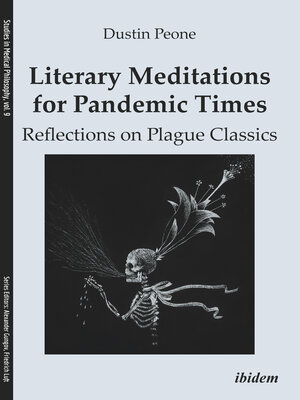Literary Meditations for Pandemic Times
ebook ∣ Reflections on Plague Classics · Studies in Medical Philosophy
By Dustin Peone

Sign up to save your library
With an OverDrive account, you can save your favorite libraries for at-a-glance information about availability. Find out more about OverDrive accounts.
Find this title in Libby, the library reading app by OverDrive.



Search for a digital library with this title
Title found at these libraries:
| Library Name | Distance |
|---|---|
| Loading... |
Throughout the COVID-19 pandemic, many new techniques for remaining healthy have been introduced, but there has been little to no public discussion about how to live well. "Social distancing" is good medicine for the body, but the health of the spirit depends on wisdom. When we find ourselves in new and dangerous conditions, we can only look to the past for counsel. In this book, originally published as Plague Literature and now in its second edition, the philosopher Dustin Peone offers reflections on ten literary classics set during plague times. From each work, he draws one central insight that is applicable to our situation today and all future pandemics. These insights are lessons in prudence, taught by the sages of the past. This is a book about how to pursue the good life during a pandemic and what it means to flourish in dark times, not just to survive. "This is a unique and timely work, offering the reader a systematic and historical perspective on the difficult and dangerous conditions of the present time." —Donald Phillip Verene, Professor Emeritus of Philosophy, Emory University An invaluable book, beautifully written in a classical style characterized by clarity and wit." —Brian P. Quaranta, Trent Center for Bioethics, Humanities, and History of Medicine, Duke University "Peone's book offers penetrating and essential insight about what is necessary for human flourishing in pandemic conditions. This should be read by anyone wishing to understand not only how to survive, but how to live well in dark and unsettling times." —Rebecca U. Thorpe, Associate Professor of Political Science, University of Washington







